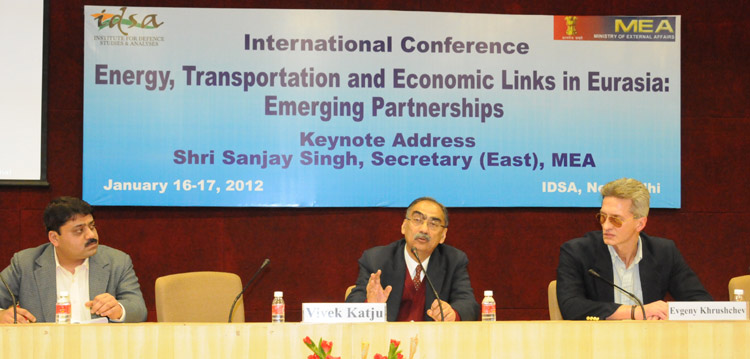You are here

Chair: Amb Vivek Katju
Panellists: Col Evgeny Khrushchev and Mr. Vishal Chandra
The panellists in this session discussed the impending need for greater regional cooperation to bring about stability in Afghanistan. They also discussed the American and Russian policies in the country and implications for the region as a whole once the American troops pull out of Afghanistan in 2014.
Col Evgeny Khrushchev deliberated on the US policy in Afghanistan and held it responsible for the tumultuous times of the 1970s when the Soviet Union was forced to withdraw from the region. He was of the opinion that despite negative media reports, the Soviet Union was able to implement crucial infrastructure projects in the country. Mr. Khrushchev observed that the flourishing narcotics business in Afghanistan has severe implications for the Eurasian region and advocated the need for a clear strategy to eradicate poppy cultivation and implement a crackdown on its trade.
Mr. Vishal Chandra argued that unless immediate steps are initiated, Afghanistan is likely to witness instability beyond the year 2014. Some of the key issues of concern include:
a) Nature of the western countries’ role and level of engagement post the year 2014.
b) Reconciliation process which has hit a dead end.
c) Whether the Afghan government can survive without the support of western troops.
He elaborated on the real possibility of resurgence of Taliban especially when doubts persist over the ability of the Afghan security forces. The two critical components of the ‘transition’ process – peace and reconciliation with the Pakistan-based leadership of the Afghan insurgent groups, and rebuilding of a relatively strong and professional Afghan National Security Force (the ANSF) – are way behind in terms of facilitating withdrawal of Western forces by 2014.
Mr. Chandra felt that the reconciliation process needs to be implemented more at the social rather than political level. A bottom-up approach with focus on weaning away and integrating low and mid-level guerrilla fighters at the village, district and provincial levels will be more effective in terms of sustaining and legitimising the process. There is a need for a sustained partnership between Afghanistan, regional countries and the international institutions. He dwelled on two scenarios in Afghanistan:
i) A highly de-stabilized country as the west withdraws.
ii) Fragile stability in the country as the west continues to engage Afghanistan.
Mr. Chandra felt that the government in Kabul and the political system established under the Bonn agreement must not be allowed to collapse under any circumstances. Permanent institutions of governance have to be built. Moreover, there is a need for some kind of reconciliation between the US and some of the regional countries, at one level, and among the regional countries, at another level.
